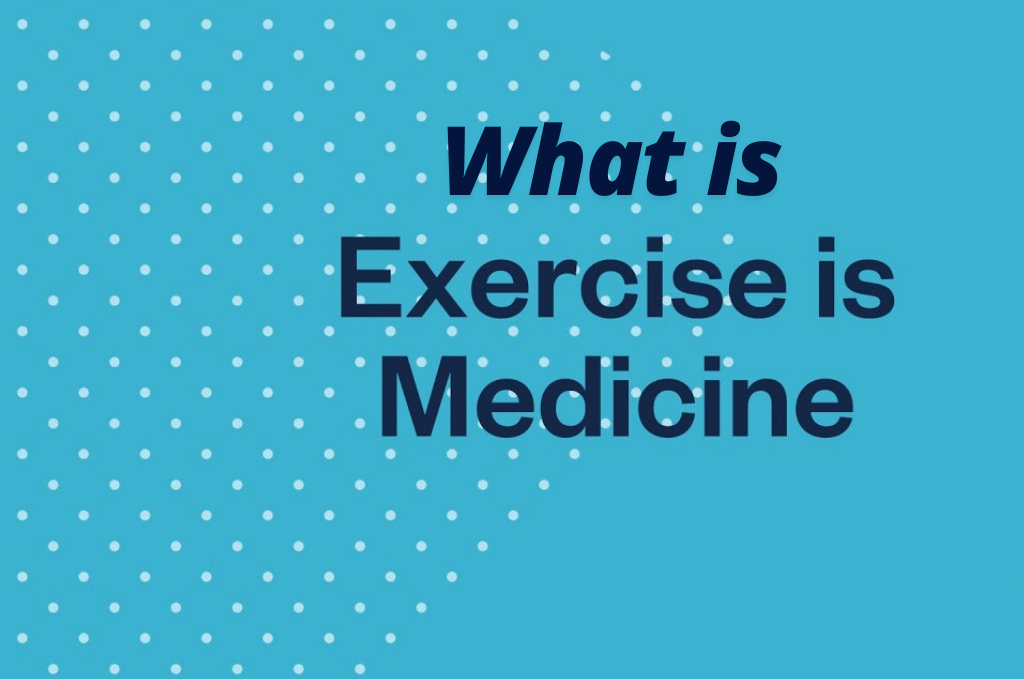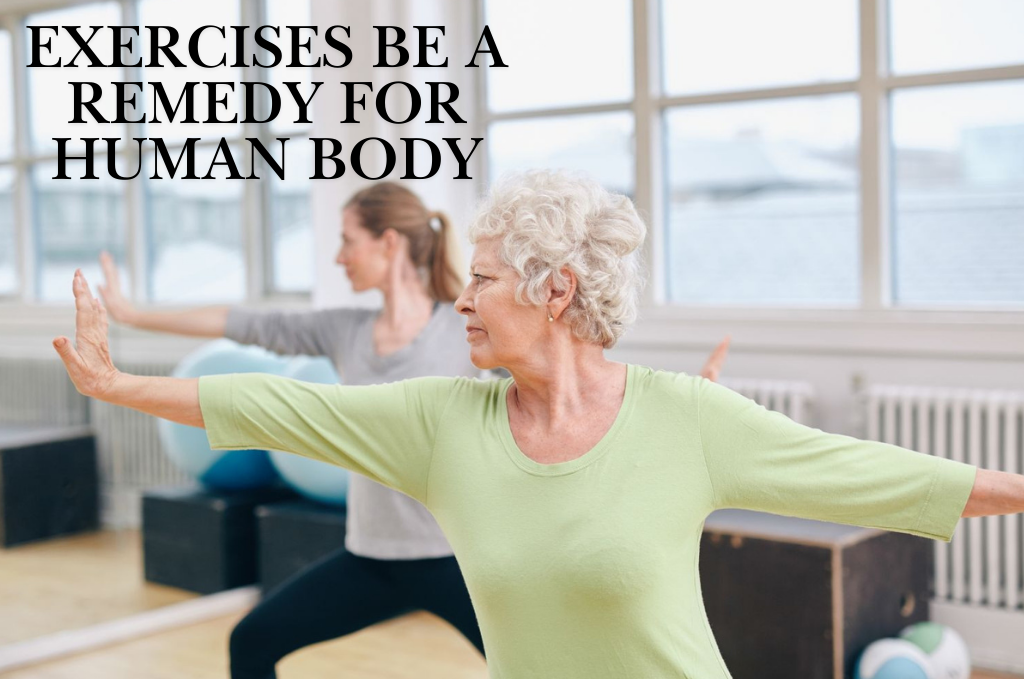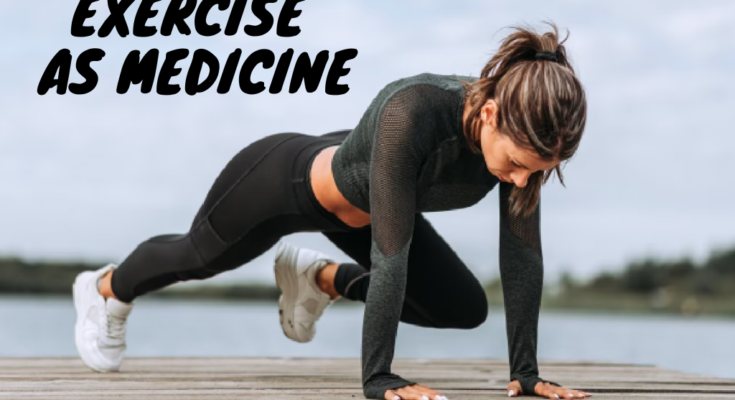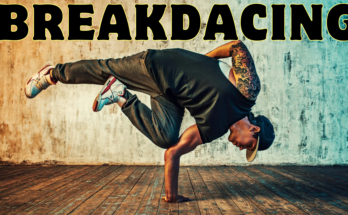Hey People! Do you know something about this? In as much as health has several aspects when considering our health, people are more likely to believe what we eat, how much sleep we have, and a new fashion diet, among others.
However, one of the most effective ways to prevent illness, improve quality of life, and increase longevity needs to be addressed: exercise. New studies have supported the idea that exercise as medicine is as real as it comes, literally and in the literal sense.
Physical exercises, especially in training, are very important in enhancing immunity, promoting longevity, and disposing of diseases.
Let begin!
Table of Contents
What is Exercise as Medicine?

Exercise as treatment as medicine is a paradigm in which exercise integrates as a treatment plan for many chronic diseases, including cardiovascular disease, diabetes, and mental illnesses. Physical activity can act as a powerful weapon against the development of diseases, their control, and even their resolution.
Several major health-related bodies, such as the American Heart Association and the American College of Sports Medicine, encourage the use of exercise as a tool to prevent disease and enhance health.
The WHO has also published a study showing that aerophilic activity can decrease the early death rate by a third.
Exercises be a Remedy for the Human Body

Effects of Exercising
Chronic movements uniquely affect immunity and the probability of lifespan in people. Here are some ways it enhances health:
Boosting the Immune System
Exercise enhances immune cell production: Integrating into physical activity means that the immune cells, such as T-cells, are circulated all over the body to help fight dropping infections.
Another study in Frontiers in Immunology showed that moderate exercise can enhance the immune system and reduce the number of infections.
Reduces Chronic Inflammation:
Low-level inflammation is associated with several diseases, including cardiovascular diseases, diabetes, and cancers.
This is why exercise or any physical activity, particularly aerobic exercises, reduces inflammation and enhances the immune system’s strength. Non-rigorously, the American Journal of Physiology notes that aerobic exercise decreases pro-inflammatory cytokines.
Improves Gut Health:
Exercise also enhances gut microbiota, which are responsible for our immune system health. A study by Frontiers in Immunology maintains that exercising helps build up healthier gut bacteria, improving immunity.
Promoting Longevity
Prevents Chronic Diseases:
Physical activity in daily life is said to help minimize the chances of lifestyle diseases such as heart disease, stroke, diabetes, and some cancers. Research based on The Lancet reported that citizens who exercise could increase their life expectancy by 4.5 years.
Enhances Cardiovascular Health:
Aerobic activities like running, walking, or swimming are good for the heart and blood vessels, decreasing the possibility of hypertension or other heart-related ailments.
Boosts Brain Health:
This work should show that exercise enhances brain performance, thereby reducing the chances of neurodegenerative illnesses such as Alzheimer’s. The Journal of Alzheimer’s Disease acknowledged that exercise lowers the risk of developing diseases associated with memory loss and improves memory and cognitive function in elderly people.
The Best Exercises to Strengthen Your Immune System
However, it is crucial to understand that all activities are good for your health; some exercise benefits the immune system and increases lifespan. Here are five highly effective workouts:
Aerobic Exercise
Aerobic exercise involves walking, jogging, cycling, and swimming. Aerobic exercises equal at least 30 minutes of this type of exercise. These increase the heart rate, efficiency of the respiratory system, and the distribution of immune cells around the body.
Why It Works:
Aerobic exercise reduces heart rate and optimum blood circulation and enhances the circulation of immune cells all over the body. In the presented study, aerobic activity is associated with decreased episodes and days of illness due to increased immune cell circulation.
How to Start:
The recommended level of aerobic activity is moderate at least five days a week, ideally at least 30 minutes per day.
Supporting Evidence
According to research conducted in The Lancet, moderate-intensity exercise enhances life span and reduces the incidence of chronic diseases such as heart disease and type 2 diabetes.
Strength Training: Building Muscle for Longevity
Resistance training, also known as strength training, involves weight lifting, bodyweight exercises, and resistance bands. Aerobic exercises are useful in preventing and treating conditions that negatively affect muscle, bones, and metabolism.
Why It Works:
Weight lifting helps regulate the quantity of T-cells, which protect the body against diseases. It also improves stability and prevents falls and osteoporosis, which are pivotal benefits for every person as they age.
How to Start:
Include strength training workouts at least two non-consecutive days per week, preferably every muscle group. Begin with regular exercises that compress the body concerning gravity before you add weights to your routine.
Supporting Evidence:
Data published in Sports Medicine confirmed that resistance training strengthens the immune system, even in older adults, and increases muscle mass and muscle strength, thus decreasing the likelihood of falls and fractures.
The following video explains about Strength Training: Building Muscle for Longevity
High-Intensity Interval Training
HIIT consists of short intervals of intense exercise followed by longer intervals of low activity or rest. This compact workout gives a person the impact of a long workout in a short time.
Why It Works:
HIIT results in better heart health boosts fat loss capacity, and enhances insulin sensitivity, thereby reducing the prevalence of type 2 diabetes. Moreover, HIIT enhances the levels of anti-inflammatory cytokines with improved immune cell traffic.
How to Start:
Generally, warm up with the formula of 30 seconds of work—for example, running, cycling, or burpees—and 30 seconds of rest, gradually increasing the time to 15-20 minutes.
Supporting Evidence:
In a study published in the Journal of Sports Sciences, HIIT enhanced circulation and provided a healthy platform for immune cell production. It has also been seen to improve the rate of metabolism and decrease body fat levels, which are necessary for a healthy body.
Yoga: Strengthen the Body and Mind
Yoga involves developing certain body postures, specific types of breathing, and meditating to enhance flexibility and strength in muscles and the mind. It is an ideal workout for those who want to lower stress levels without straining the body.
Why It Works:
Yoga increases the parasympathetic nervous system, which aids digestion and boosts the immune system. It also decreases cortisol levels, which decreases repeated inflammation. In addition, flexibility, balance, and joint health work to increase longevity, and yoga offers all of these.
How to Start:
Start with easier asanas, such as downward dog, child pose, and tree pose. You can locate beginner classes or follow tutorial videos to dictate your procedure.
Supporting Evidence:
A study in the Journal of Alternative and Complementary Medicine explains how yoga helps alleviate signs of chronic stress and supports immune function, delivering the body and mind a beneficial health challenge to live longer.
Walking: Exercises that Create a Full-Blown Dance
I just love walking. It is one of the simplest forms of exercise and can easily be done by people who cannot do it more vigorously due to age, health complications, or lack of practice, among other reasons.
Why It Works:
Improved cardiovascular fitness through exercise, such as walking, lowers the risk of contracting chronic diseases and boosts emotional well-being. Walking is also a weight-bearing exercise, so it assists in preventing osteoporosis among senior ladies.
How to Start:
Ideally, walk briskly for thirty minutes a day. If you are starting, split it into sessions throughout the day.
Supporting Evidence:
NIH adds that walking can extend your lifespan by as much as 4.5 years by helping to lower the risk of chronic diseases while boosting mood.
Conclusion
By now, it is not a secret that exercise is considered medicine. Exercise has far-reaching effects on immunity, lifespan, and overall health.
When you add aerobic exercise, strength training, HIIT, yoga, and even walking to your schedule, you improve your immunity, minimize your susceptibility to persistent diseases, and live a longer life.
Remember, consistency is key. Do not overdo it at the beginning, and make exercise part and parcel of your lifestyle. It saves time. You’ll be happy when your future self is grateful for not having to start from scratch.
FAQ
1. Is it possible to use exercise instead of medication for certain diseases?
Well, yes, exercise can potentially date and sometimes even cure several chronic diseases. Research has also indicated that exercise is as powerful as drugs for diseases such as high blood pressure, diabetes type 2, and even depression.
But, exercise should be done alongside other treatments for severe diseases and illnesses. Please check with a healthcare provider before beginning any new activity.
2. What is the dose of exercise to experience changes in the immune response?
Thus, for most people, moderate-intensity aerobic exercise for at least 150 minutes during the week is more than enough to enhance the immune system response. Strength training twice a week also improves the body’s general immune responses. A major secret to realizing the rewards is consistency.
3. Which form of exercise is most effective for increasing immunity?
Endurance exercises, such as walking, jogging, cycling, and other activities, as well as strength training, are the best for enhancing the immune system. That way, added value will cover both aspects: the cardiovascular system, muscles, and immune responses.
4. Can one exercise too much for the immune system to handle?
Indeed, any exercise that causes excess training stress, especially without adequate recovery, will suppress immunity and lead to susceptibility to disease and illness. The consideration is that the best middle ground is the best: regular exercise that does not overwork the body is best in boosting immune function.
5. What can I do to motivate myself to exercise?
One can set achievable goals for oneself, monitor progress through regular assessments, and adopt a form of exercise one enjoys. Also, doing exercises with a friend or exercising in a group via attending a class increases its utility or social reward, which makes exercising even more enjoyable and worthwhile.




